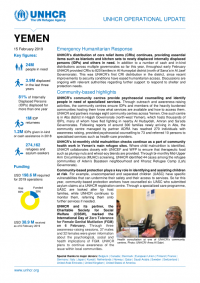Yemen: UNHCR Operational Update, 15 February 2019
Key figures:
24M people in need
3.9M displaced in the last three years
81% of Internally Displaced Persons (IDPs) displaced for more than one year
1M IDP returnees
1.2M IDPs given in-kind or cash assistance in 2018
274,162 refugees and asylum-seekers
Funding
USD 198.6 M required for 2019 operations
USD 38.9 M received as of 6 February 2019
Emergency Humanitarian Response
UNHCR’s distribution of core relief items (CRIs) continues, providing essential items such as blankets and kitchen sets to newly displaced internally displaced persons (IDPs) and others in need. In addition to a number of cash and in-kind distributions across multiple governorates so far this year, throughout early February UNHCR provided CRIs to 820 families in Al Humaydat district (north of Sana’a in Al Jawf Governorate). This was UNHCR’s first CRI distribution in the district, since recent improvements to security conditions have eased humanitarian access. Discussions are ongoing with relevant authorities regarding further support to respond to shelter and protection needs.
Community-based highlights
UNHCR’s community centres provide psychosocial counselling and identify people in need of specialized services. Through outreach and awareness-raising activities, the community centres ensure IDPs and members of the heavily burdened communities hosting them know what services are available and how to access them.
UNHCR and partners manage eight community centres across Yemen. One such centre is in Abs district in Hajjah Governorate (north-west Yemen), which hosts thousands of IDPs, many of whom have fled fighting in nearby Al Hudaydah, Amran and Sa’ada Governorates. Following reports of around 300 families newly arriving in Abs, the community centre managed by partner ADRA has reached 270 individuals with awareness raising, provided psychosocial counselling to 73 and referred 10 persons to specialised services such as health-care providers.
UNHCR’s bi-monthly child malnutrition checks continue as a part of community health work in Yemen’s main refugee sites. Where child malnutrition is identified, UNHCR collaborates closely with UNICEF and WFP to ensure that therapeutic food such as plumpy nuts and wheat-soy blends are provided. Through bi-monthly Mid-Upper Arm Circumference (MUAC) screening, UNHCR identified 44 cases among the refugee communities of Aden’s Basateen neighbourhood and Kharaz Refugee Camp (Lahj Governorate).
Community-based protection plays a key role in identifying and assisting children at risk. For example, unaccompanied and separated children (UASC) have specific vulnerabilities that can undermine their safety and their access to services. So far this year, community-based protection workers have counselled six UASC who submitted asylum claims at a UNHCR registration centre. Through a specialized care programme, UASC are looked after by host families, while UNHCR continues to monitor them, referring them onto further services if needed.
UNHCR and its partner, the Charitable Society for Social Welfare (CSSW), marked the International Day of Zero Tolerance for Female Genital Mutilation (FGM) on 6 February. Through three awareness-raising sessions, 37 males and 32 females were given information about the psychological, social and health implications of FGM. UNHCR plans to continue awareness of the issue within local communities.
https://reliefweb.int/report/yemen/yemen-unhcr-operational-update-15-february-2019


